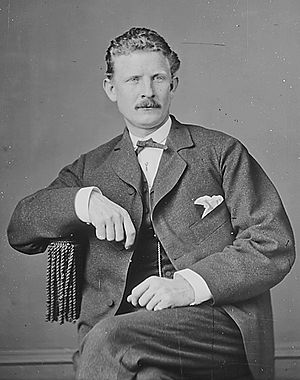Joseph Barr Kiddoo facts for kids
Quick facts for kids
Joseph Barr Kiddoo
|
|
|---|---|

Gen. Joseph B. Kiddoo
|
|
| Born | March 31, 1837 Pittsburgh, Pennsylvania |
| Died | October 19, 1880 (aged 43) New York, New York |
| Buried |
West Point Cemetery
(41°23′53″N 73°58′01″W / 41.398°N 73.967°W) |
| Allegiance | United States of America |
| Service/ |
United States Army Union Army |
| Years of service | 1861–1870 |
| Rank | Brigadier General |
| Unit | 12th Pennsylvania Infantry |
| Commands held | 137th Pennsylvania Infantry 6th United States Colored Infantry Regiment 22nd United States Colored Infantry |
| Battles/wars | Battle of South Mountain Battle of Antietam Battle of Fredericksburg Battle of Chancellorsville Siege of Petersburg Battle of the Crater |
Joseph Barr Kiddoo (March 31, 1837 – August 19, 1880) was an important officer in the Union Army during the American Civil War. After the war, he served as an assistant commissioner for the Freedmen's Bureau in Texas, helping formerly enslaved people.
Contents
Joseph B. Kiddoo: A Civil War Hero
Joseph Barr Kiddoo was born in Pittsburgh, Pennsylvania. When the American Civil War began, he joined the Union volunteers in 1861. He quickly rose through the ranks, starting as a private and becoming a colonel.
Early Military Service
Kiddoo served with the Pennsylvania Union volunteers from 1861 to 1863. During this time, he fought in several major battles. These included the Battle of South Mountain, the Battle of Antietam, and the Battle of Fredericksburg. He also took part in the Battle of Chancellorsville.
Leading African-American Troops
After 1863, Kiddoo took on a very important role. He began commanding African-American troops. This was a significant step during the war. He led the 6th United States Colored Infantry Regiment and later the 22nd United States Colored Infantry. He showed great bravery while leading these soldiers. For example, he was recognized for his courage during the Second Battle of Fair Oaks.
After the War
After the Civil War ended, Joseph Kiddoo continued to serve. He was promoted to brigadier general of volunteers in June 1865. He also became a major general of volunteers in September 1865. In the regular army, he was made a brigadier general in 1867. This was to honor his brave service and leadership.
Kiddoo retired from the army as a brigadier general in December 1870. He passed away in New York City in 1880. He was buried at the West Point Cemetery.
 | Aaron Henry |
 | T. R. M. Howard |
 | Jesse Jackson |

